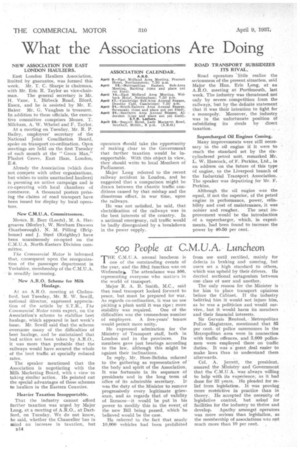500 People at C.M.U.A. Luncheon T HE C.IVI.U.A. annual luncheon is
Page 48

If you've noticed an error in this article please click here to report it so we can fix it.
one of the outstanding events of the year, and the 33rd function was on Wednesday, The attendance was 500, representing everyone who mat te,s in the world of transport.
Major R. A. B. Smith, M.C., said that road transport looked forward to peace, but must be prepared for war. As regards co-ordination, it was no use picking a plum until it was ripe ; more
stability was required. One of the difficulties was the tremendous number of employers. A five-years' tenure would permit more unity.
He expressed admiration for the Ministry of Transport staff, both in London and in the provinces. Its members gave just hearings according to the law, although this might be against their inclinations.
In reply, Mr. Hore-Belisha referred to the gathering as representative of ' the body and spirit of the Association. It was fortunate in its sequence of presidents and in the long term of office of its admirable secretary. It was the duty of the Minister to remove progressively every legitimate grievance, and as regards that of validity of licences—it would be put in his power to modify this in the event, of the new Bill being passed, which he believed would be the case.
He referred to the fact that nearly 10,000 vehicles had been prohibited
from use until rectified, mainly for defects in braking and steering, but users set a high standard to others, which was upheld by their drivers. He decried sectional antagonism between one class of user and another.
The only reason for the Minister is for him to place transport opinions before the Cabinet. .If the industry belittled him it would not injure him, as he was a politician and would survive, but it would harm its members and their financial interests.
Sir Gervais Rentoul, • Metropolitan Police Magistrate, mentioned that 85 per cent. of police summonses in the Metropolitan area were in connection with traffic offences, and 3,000 policemen were employed there on traffic duties. It was a great deal easier to make laws than to understand them afterwards.
Col. A. Jerrett, the president, assured the Ministry and Government that the C.M.I.1 A. was always willing to help with its experience, as it had done for 33 years. Ho pleaded for relief from legislation. It was proving more restrictive in practice than in theory. He accepted the necessity of legislative control, but asked for facilities for the industry to thrive and develop. Apathy amongst operators was more serious than legislation, as the membership of associations was not much more than 10 per cent.




















































































